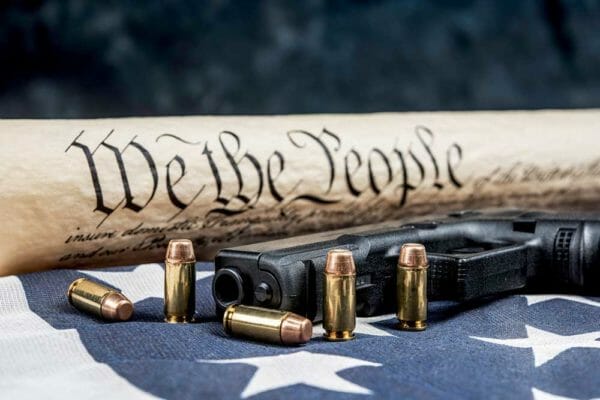
U.S.A. –-(AmmoLand.com)- Constitutional Carry has become a mainstream movement. The term means a state’s laws concerning the carry of weapons approximates the state of the law when the Second Amendment was ratified in 1791. At that time, no permits were required to carry weapons, openly or concealed.
17 states have restored a reasonable facsimile of Constitutional Carry. Vermont always had Constitutional Carry. Serious efforts are underway to restore Constitutional Carry in three other states in 2021, with various states of possibility in twenty other states.
Given the coming predominance of Constitutional Carry, what impact does it have on those with permits? How do Constitutional Carry states treat reciprocity issues?
Are permits still useful with Constitutional Carry?
Reciprocity is generally not an issue in Constitutional Carry states, because carrying a loaded handgun, openly or concealed is legal in most public places, most of the time.
However, the answers are not as simple and clear-cut as first they might appear. Some states have minor cut-outs which allow carrying with permits in some places where carry without permits is prohibited. For example, in Arizona, a permit is required to legally carry in a bar. While Michigan is not a Constitutional Carry state yet, a permit is required to openly carry in a school, where concealed carry is prohibited.
There are three Constitutional Carry states which limit Constitutional Carry to residents.
Idaho, North Dakota, and Wyoming limit Constitutional Carry to residents only. This is a highly controversial and dubious distinction. It is likely to be challenged under the equal protection clause of the U.S. Constitution, the Fourteenth Amendment. No court cases under the equal protection clause are in progress, regarding Constitutional Carry, to my knowledge.
Permits from most states are recognized by most states, making a concealed carry permit a useful item when a person exercises their Second Amendment rights across state lines.
All 17 states which had a permit system in place before they restored Constitutional Carry have kept their permit system in place for those who find a permit useful for a number of reasons.
Vermont does not issue a permit. States cannot honor a permit that does not exist.
Of the three Constitutional Carry states which claim to limit Constitutional Carry to residents, Idaho honors permits from all other states.
North Dakota recognizes permits from 37 states. Wyoming Recognizes permits from 40 states.
State law and reciprocity status are constantly changing. The following interpretations of reciprocity were obtained from online sources, and are subject to change and error. It is recommended that persons traveling to or through other states check their reciprocity law online before traveling.
The author is not a lawyer. This article is not legal advice.
Here is the reciprocity status for the 18 Constitutional Carry states:
- Alaska – honors all other states permits.
- Arizona – honors enhanced Resident and Non-Resident permits from Idaho, and all permits from all other states.
- Arkansas – honors all other states permits.
- Idaho – honors all other states permits.
- Kansas – honors all other states permits.
- Kentucky – honors all other states permits.
- Maine – honors resident permits from 27 states. Those are:
Alabama, Alaska, Arizona, Arkansas, Delaware, Florida, Georgia,, Idaho, Indiana, Iowa, Kansas, Kentucky, Louisiana, Michigan, Mississippi, Missouri, Mississippi, Nebraska, New Hampshire, North Carolina, North Dakota, Ohio, Oklahoma, South Dakota, Tennessee, Utah, Virginia, and Wyoming.
- Maine does not honor permits from 21 states. They are:
California, Colorado, Connecticut, Hawaii, Illinois, Maryland, Massachusetts, Minnesota, Montana, Nevada, New Jersey, New Mexico, New York, Oregon, Pennsylvania, Rhode Island, South Carolina, Texas, Washington, West Virginia, or Wisconsin.
- Mississippi – honors all other states permits.
- Missouri – honors all other states permits.
- Montana – honors most other states permits. Does not honor permits from:
Delaware, Hawaii, Maine, New Hampshire, and Rhode Island.
- New Hampshire – honors permits from 28 states. Those are:
Alabama, Alaska, Arizona, Arkansas, Colorado, Florida, Georgia, Idaho, Indiana, Iowa, Kansas, Kentucky, Louisiana, Maine, Michigan, Mississippi, Missouri, North Carolina, North Dakota, Ohio, Oklahoma, Pennsylvania, South Dakota, Tennessee, Utah, Virginia, West Virginia and Wyoming.
- New Hampshire does not honor permits from 20 states. They are:
California, Connecticut, Delaware, Hawaii, Illinois, Maryland, Massachusetts, Minnesota, Montana, Nebraska, Nevada, New Jersey, New Mexico, New York, Oregon, Rhode Island, South Carolina, Texas, Washington, or Wisconsin.
- North Dakota – honors permits from most states. North Dakota does not honor permits from 10 states. They are:
California, Connecticut, Hawaii, Illinois, Maryland, Massachusetts, New Jersey, New York, Oregon, or Rhode Island.
- Oklahoma – honors all other states permits.
- South Dakota – honors all other states permits.
- Utah – honors all other states permits.
- West Virginia – honors permits from most states. West Virginia does not honor permits from:
California, Connecticut, Hawaii, Illinois, Maryland, Massachusetts, Minnesota, New Jersey, New York, Oregon, or Rhode Island or Washington.
- Wyoming – honors permits from most states. Wyoming does not honor permits from 13 states. They are:
California, Connecticut, Delaware, Hawaii, Illinois, Maryland, Massachusetts, Minnesota, New Jersey, New York, Oregon, Rhode Island, or Washington.
- Vermont – Does not have a permit system, and does not honor permits from any other state.
As a Constitutional Carry state, it is not against the law to carry a weapon, openly or concealed, if there is no intent to commit a crime.
About Dean Weingarten:
Dean Weingarten has been a peace officer, a military officer, was on the University of Wisconsin Pistol Team for four years, and was first certified to teach firearms safety in 1973. He taught the Arizona concealed carry course for fifteen years until the goal of Constitutional Carry was attained. He has degrees in meteorology and mining engineering, and retired from the Department of Defense after a 30 year career in Army Research, Development, Testing, and Evaluation.

